 Backend Development
Backend Development
 PHP Problem
PHP Problem
 How do we customize the regular expression for matching mobile phone numbers in PHP? (with code)
How do we customize the regular expression for matching mobile phone numbers in PHP? (with code)
How do we customize the regular expression for matching mobile phone numbers in PHP? (with code)
The previous article introduced you to " Let's talk about the regular expression function in PHP? How to use it (with code) 》, this article continues to introduce to you how we can customize the regular expression that matches mobile phone numbers in PHP?

How do we customize the regular expression that matches mobile phone numbers in PHP?
As for mobile phone numbers, we all know that in mainland China, they usually start with 1, and the middle two digits may be 3 4 5 7 8; if the second digit is 3, the third digit It may be 0-9. If the second digit is 4, the third digit may be 7.
If the second digit is 5, the third digit may be 0-8. If the second digit is 7. The third digit is 0-8. If the second digit is 8, the third digit may be 0-9. The next 8 digits can be any combination. When we get the mobile phone number, we need to perform regular matching and enter ( $pattre), for mobile phone numbers, we need exact matching, so we need to add (^$), we start with 1 and end with \d{8}. At this time, we need to add brackets and modify them. If we say The third digit is 3, then our third digit can be 0-9, which is our first case
Next, we enter a field and then match;
Code demonstration:
<?php
/*
第一位1
第二位3 4 5 7 8
第三位0-9 7 0-8 01235678 0-9
后八位0-9任意
*/
$phone =' 12345678901 ' ;
$pattern = '/^1(?:3[0-9])\d{8}$/S';
$result = preg_match($pattern, $phone);
echo '匹配结果为:' . $result;The demonstration results are as follows:
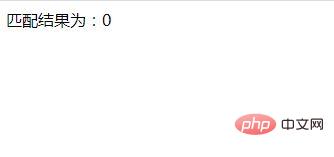
The demonstration results show that our matching result is 0, obviously we did not match successfully;
If I change the input field to 133..., we run it again and find that the matching result is 1;
$phone ='13345678901';
The demonstration results are as follows:
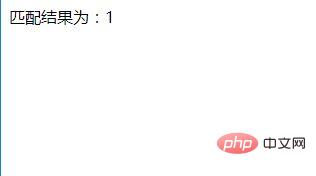
By analogy, as long as we do not exceed the range of 0-9, the matching result can be 1;
If our second number is 4, then our third number can only be 7, so When we need to change the code to 47, the code is as follows:
$pattern = '/^1(?:3[0-9]|47)\d{8}$/S';When we change 131 to 141, we will find that the matching result is 0 (the code displays the result as follows), because we have declared that if our second number is If 4, then our third number can only be 7. When our output is 147, we will find that the matching result is 1;
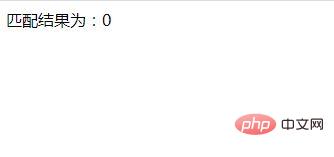
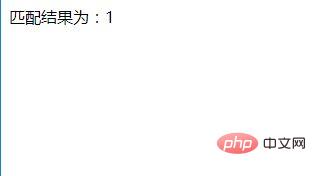
$phone ='14745678901';
$pattern = '/^1(?:3[0-9]|47)\d{8}$/S';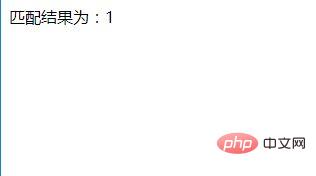
$phone ='15045678901';
$pattern = '/^1(?:3[0-9]|47|5\d)\d{8}$/S';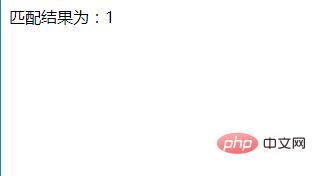
$phone ='17045678901';
$pattern = '/^1(?:3[0-9]|47|5\d|7[0-35-8])\d{8}$/S';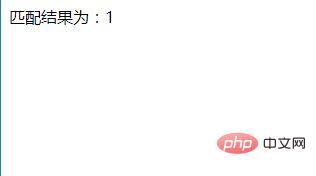
$phone ='17045678901';
$pattern = '/^1(?:3[0-9]|47|5\d|7[0-35-8]|8\d)\d{8}$/S';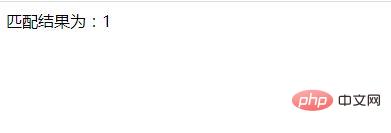
PHP Video Tutorial"
The above is the detailed content of How do we customize the regular expression for matching mobile phone numbers in PHP? (with code). For more information, please follow other related articles on the PHP Chinese website!

Hot AI Tools

Undresser.AI Undress
AI-powered app for creating realistic nude photos

AI Clothes Remover
Online AI tool for removing clothes from photos.

Undress AI Tool
Undress images for free

Clothoff.io
AI clothes remover

Video Face Swap
Swap faces in any video effortlessly with our completely free AI face swap tool!

Hot Article

Hot Tools

Notepad++7.3.1
Easy-to-use and free code editor

SublimeText3 Chinese version
Chinese version, very easy to use

Zend Studio 13.0.1
Powerful PHP integrated development environment

Dreamweaver CS6
Visual web development tools

SublimeText3 Mac version
God-level code editing software (SublimeText3)

Hot Topics
 PHP regular expression validation: number format detection
Mar 21, 2024 am 09:45 AM
PHP regular expression validation: number format detection
Mar 21, 2024 am 09:45 AM
PHP regular expression verification: Number format detection When writing PHP programs, it is often necessary to verify the data entered by the user. One of the common verifications is to check whether the data conforms to the specified number format. In PHP, you can use regular expressions to achieve this kind of validation. This article will introduce how to use PHP regular expressions to verify number formats and provide specific code examples. First, let’s look at common number format validation requirements: Integers: only contain numbers 0-9, can start with a plus or minus sign, and do not contain decimal points. floating point
 How to validate email address in Golang using regular expression?
May 31, 2024 pm 01:04 PM
How to validate email address in Golang using regular expression?
May 31, 2024 pm 01:04 PM
To validate email addresses in Golang using regular expressions, follow these steps: Use regexp.MustCompile to create a regular expression pattern that matches valid email address formats. Use the MatchString function to check whether a string matches a pattern. This pattern covers most valid email address formats, including: Local usernames can contain letters, numbers, and special characters: !.#$%&'*+/=?^_{|}~-`Domain names must contain at least One letter, followed by letters, numbers, or hyphens. The top-level domain (TLD) cannot be longer than 63 characters.
 How to match timestamps using regular expressions in Go?
Jun 02, 2024 am 09:00 AM
How to match timestamps using regular expressions in Go?
Jun 02, 2024 am 09:00 AM
In Go, you can use regular expressions to match timestamps: compile a regular expression string, such as the one used to match ISO8601 timestamps: ^\d{4}-\d{2}-\d{2}T \d{2}:\d{2}:\d{2}(\.\d+)?(Z|[+-][0-9]{2}:[0-9]{2})$ . Use the regexp.MatchString function to check if a string matches a regular expression.
 Master regular expressions and string processing in Go language
Nov 30, 2023 am 09:54 AM
Master regular expressions and string processing in Go language
Nov 30, 2023 am 09:54 AM
As a modern programming language, Go language provides powerful regular expressions and string processing functions, allowing developers to process string data more efficiently. It is very important for developers to master regular expressions and string processing in Go language. This article will introduce in detail the basic concepts and usage of regular expressions in Go language, and how to use Go language to process strings. 1. Regular expressions Regular expressions are a tool used to describe string patterns. They can easily implement operations such as string matching, search, and replacement.
 PHP regular expressions: exact matching and exclusion of fuzzy inclusions
Feb 28, 2024 pm 01:03 PM
PHP regular expressions: exact matching and exclusion of fuzzy inclusions
Feb 28, 2024 pm 01:03 PM
PHP Regular Expressions: Exact Matching and Exclusion Fuzzy inclusion regular expressions are a powerful text matching tool that can help programmers perform efficient search, replacement and filtering when processing text. In PHP, regular expressions are also widely used in string processing and data matching. This article will focus on how to perform exact matching and exclude fuzzy inclusion operations in PHP, and will illustrate it with specific code examples. Exact match Exact match means matching only strings that meet the exact condition, not any variations or extra words.
 How to verify password using regular expression in Go?
Jun 02, 2024 pm 07:31 PM
How to verify password using regular expression in Go?
Jun 02, 2024 pm 07:31 PM
The method of using regular expressions to verify passwords in Go is as follows: Define a regular expression pattern that meets the minimum password requirements: at least 8 characters, including lowercase letters, uppercase letters, numbers, and special characters. Compile regular expression patterns using the MustCompile function from the regexp package. Use the MatchString method to test whether the input string matches a regular expression pattern.
 Chinese character filtering: PHP regular expression practice
Mar 24, 2024 pm 04:48 PM
Chinese character filtering: PHP regular expression practice
Mar 24, 2024 pm 04:48 PM
PHP is a widely used programming language, especially popular in the field of web development. In the process of web development, we often encounter the need to filter and verify text input by users, among which character filtering is a very important operation. This article will introduce how to use regular expressions in PHP to implement Chinese character filtering, and give specific code examples. First of all, we need to clarify that the Unicode range of Chinese characters is from u4e00 to u9fa5, that is, all Chinese characters are in this range.
 What are the regular expression wildcards?
Nov 17, 2023 pm 01:40 PM
What are the regular expression wildcards?
Nov 17, 2023 pm 01:40 PM
Regular expression wildcards include ".", "*", "+", "?", "^", "$", "[]", "[^]", "[a-z]", "[A-Z] ","[0-9]","\d","\D","\w","\W","\s&quo





